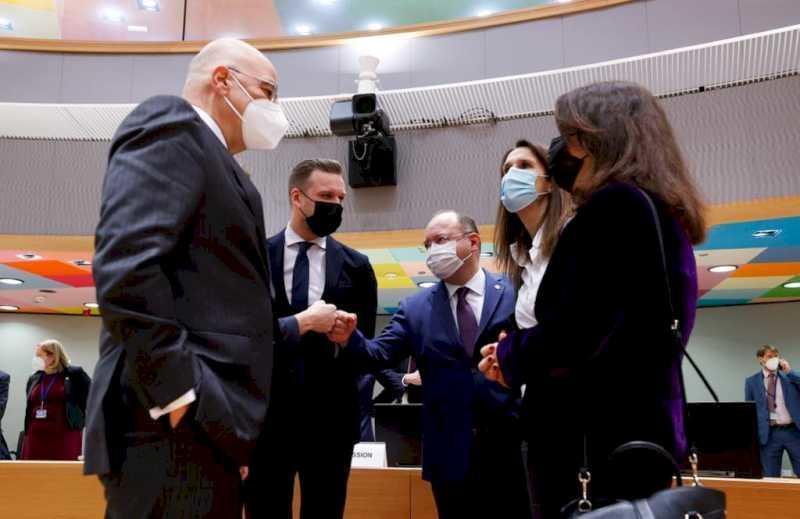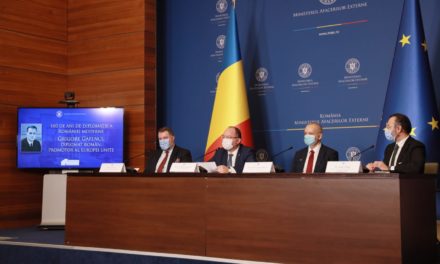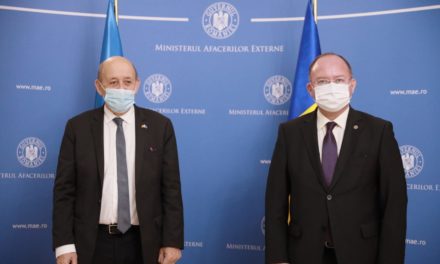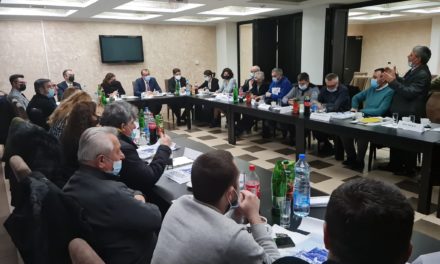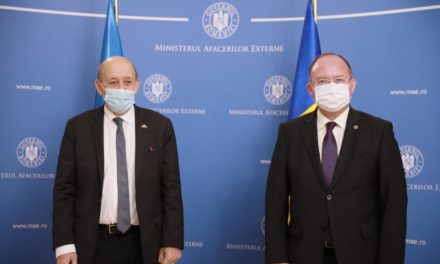Ministrul afacerilor externe Bogdan Aurescu a deschis vineri, 14 octombrie 2022, evenimentul cu titlul „MAE 160 – Contribuția lui Vespasian V. Pella și a diplomației române în domeniul dreptului internațional, o perspectivă istorică”, cu ocazia lansării volumului în limba engleză “Vespasian V. Pella and the ideal of peace through law”, de prof. univ. dr. Aurora Ciucă.
Evenimentul, desfășurat la sediul Ministerului Afacerilor Externe, face parte din seria de acțiuni dedicate împlinirii, în anul 2022, a 160 de ani de la înființarea Departamentului Trebilor Străine și de Stat, prima formulă instituțională modernă a Ministerului român al Afacerilor Externe.
Totodată, anul 2022 marchează și aniversarea a 125 de ani de la nașterea lui Vespasian Pella și comemorarea a 70 de ani de la trecerea sa în neființă.
Evenimentul a avut drept scop promovarea contribuției unuia dintre cei mai mari diplomați și juriști români, Vespasian V. Pella – unul dintre „părinții fondatori” ai dreptului internațional penal și ai conceptului de Curte Penală Internațională cu caracter permanent, precum și a perspectivei istorice a preocupării constante a diplomației române în acest domeniu.
,,În aceste vremuri complexe și dificile, precum cele pe care le trăim astăzi, marcate de războiul de agresiune brutal, neprovocat, nejustificat și ilegal al Rusiei împotriva Ucrainei, importanța dreptului internațional, a statului de drept la nivel internațional și a instrumentelor dreptului internațional devine mai evidentă ca niciodată. Dreptul internațional este crucial și vital. Iar personalitatea lui Vespasian Pella este centrală în eforturile noastre de a reafirma această importanță. El avea o viziune modernă, avansată și sofisticată asupra lumii, interpretată prin prisma dreptului internațional. (…). România are un angajament de lungă durată de a promova respectarea dreptului internațional, ca pilon fundamental al politicii sale externe. Instituția răspunderii este esențială în conexiune cu ceea ce se întâmplă în Ucraina, cu ceea ce se întâmplă chiar acum cetățenilor ucraineni. Suntem deja angajați în demersuri pentru a trage Rusia la răspundere față de comportamentul său ilegal. (…). Vom continua să ne jucăm rolul în acest efort colectiv fără precedent de a face dreptate victimelor gravelor crime comise în Ucraina. Făptuitorii trebuie să plătească, iar eforturile noastre colective trebuie să fie eficiente, întrucât Ucraina trebuie să aibă parte de dreptatea pe care o merită’’, a declarat cu acest prilej ministrul Bogdan Aurescu.
Alături de șeful diplomației române, în cadrul evenimentului au intervenit prof. univ. dr. Aurora Ciucă, autoarea volumului prezentat, Adrian Cioflâncă, istoric, director al Centrului pentru Studiul Istoriei Evreilor din România, și Doru Gheorghe Liciu, șeful Unității Arhive Diplomatice din cadrul MAE român. De asemenea, prof. univ. dr. Ben Ferencz, ultimul procuror în viață al procesului de la Nűrnberg, fost profesor al Facultății de Drept a Universității Harvard, a transmis un mesaj cu această ocazie.
Intervenția video a ministrului afacerilor externe Bogdan Aurescu poate fi urmărită aici: https://www.mae.ro/node/59943.
Transmitem, în continuare, transcrierea discursului ministrului afacerilor externe Bogdan Aurescu:
Your Excellencies,
Ladies and Gentlemen,
It is, for me, a great honour and pleasure to welcome you here, at the Ministry of Foreign Affairs, for a very important event, which is also very close to my heart, as a diplomat, but also as a professor of international law.
I welcome the publication of the English edition of this valuable biographical work by Professor Aurora Ciucă, dedicated to the life and activity of Vespasian Pella, prestigious Romanian lawyer, scholar, diplomat and professor.
I confess that ever since I have seen the Romanian edition of this volume, I considered that it is highly important to have an English version as well, as this brings added-value to the endeavors of the Romanian Ministry of Foreign Affairs to promote and increase accessibility to the legacy of some of the most emblematic diplomatic personalities who contributed to the formation and consolidation of our modern foreign policy.
I’m also very happy that this book is being published in a very symbolic year, as we celebrate, in 2022, 160 years since the modern Romanian Ministry of Foreign Affairs was founded; but also, because this year marks the 125th commemoration of the birth and 70 years since the passing away of Vespasian Pella, whose lifelong legacy is more relevant today than ever.
During these complex and difficult times, as the ones we are living today, marked by Russia’s brutal, unprovoked, unjustified, illegal war of aggression against Ukraine, the importance of international law, of international rule of law, of the instruments of international law, becomes more obvious than ever. International law is crucial and vital.
And the personality of Vespasian Pella is central to our endeavors to reaffirm this importance. He had a modern, forward thinking and sophisticated view of the world through the prism of international law. He was a pioneer and a founding father of the International Criminal Law, a sub-branch of International Law. He was also a vocal and early advocate of the idea of establishing a permanent International Criminal Court. The creation of the International Criminal Court in 2002, following the entry into force of the Rome Statute, can also be considered as a direct result of the tireless work of Vespasian Pella, which was fueled by his belief that the world without impunity may be created through collective contribution and sound legal responsibility of states.
A comparison with his landmark study of 1950, “Towards an International Criminal Court”, which was published by the American Journal of International Law, with the current structure and way of functioning of the International Criminal Court in The Hague, shows that most of Pella’s vision became reality.
During the high-level week of the UN General Assembly of this year, I have participated in a series of important meetings, one of them being a meeting of the UN Security Council to discuss the topic of justice and accountability regarding Ukraine. Romania’s message at that meeting was loud and clear. And it was in line with the vision of Vespasian Pella. My message was that we have to make sure that justice is being served and accountability is pursued; that we cannot allow for the rules-based international order to be undermined. I underlined that Romania is firm in its conviction that the principles of international law must be upheld, that all breaches of international law must be sanctioned, that any illegal conduct in international affairs cannot be left without consequences by the international community as a whole. I reiterated the fact that the momentum for international law and international justice must be maintained. And we have to show efficiency in our actions to protect the integrity of fundamental norms and documents such as the UN Charter.
Romania has a longstanding commitment to promote the respect for international law, as a fundamental pillar of our foreign policy. Accountability is essential when dealing with what was happening in Ukraine, it’s happening right now, to the Ukrainians. We are already engaged in demarches to hold Russia responsible for its wrongful and unlawful conduct.
Based on our firm attachment to efficient multilateralism and respect for international law, Romania joined, as many of you know already, the proceedings initiated by Ukraine against Russia before the International Court of Justice, in the case concerning Allegations of genocide under the Convention on the Prevention and Punishment of the Crime of Genocide. Vespasian Pella was the main drafter of this Convention. On September 13, Romania’s declaration of intervention in this case was filed with the Court, and I’m honored to serve as Agent of Romania in this case.
On September 16, Romania also submitted to the European Court of Human Rights the request for intervention concerning the case filed by Ukraine against Russia at the Court on February 28, 2022.
Romania was also one of the 43 states that referred the situation in Ukraine, in March, to the prosecutor of the International Criminal Court, in order to facilitate the swift start of the investigation on war crimes, crimes against humanity and the crimes of genocide committed in Ukraine during Russia’s war of aggression.
Romania is, thus, a strong supporter of the efforts to seek accountability for all serious crimes committed in Ukraine. This goes, as well, as far as the crime of aggression is concerned. At the same time, we find that it is essential to identify the most rigorous, legal and largely endorsed solutions to operationalize this ambitious goal. Romania will support the goal of creating a special tribunal for the crime of aggression in relation to the situation in Ukraine.
And we will continue to play our part in the unprecedented collective effort to render justice to the victims of the most serious crimes committed in Ukraine. The perpetrators have to pay, and our collective efforts must be efficient in this regard, as Ukraine seeks the justice it deserves.
Ladies and gentlemen,
Coming back to Vespasian Pella, I also want to emphasize the fact that beyond his drafting of the United Nations Convention on Prevention and Punishment of the Crime of Genocide, he was also the author of the definition of the crime of genocide – this is less known – which he called, at that time, “la crime de barbarie”.
Beyond that, he was also very much influential in his studies and ideas as far as the implementation of the principle of nulla poena sine lege as basis for international crimes’ punishment and also influenced the Universal Declaration of Human Rights.
Pella’s work also laid the foundation of other future practical and conceptual exigencies of the constantly evolving body of international law. For instance, he envisioned the inclusion of the crime of terrorism in the Statute of the International Criminal Court, an idea that was debated by the drafters of the Rome Statute and is still under the scrutiny of international scholars and of international policymakers, as I mentioned.
In 1935, based again on a proposal prepared by Pella, the texts of the Convention for the Prevention and Punishment of Terrorism and the Convention for the creation of an International Criminal Court were submitted to the first session of the Committee for the International Repression of Terrorism of the League of Nations. These documents were signed in 1937 by 13 states, but unfortunately, they never came into force, because of the events leading up to the outbreak of the World War II.
Over the years, the Romanian Ministry of Foreign Affairs has continuously supported researchers in bringing Pella’s ideas to modern light and to promote his merits in the context of various events organized in Romania and abroad. In this context, I want to recall that, in November 2020, it was my great honor to present, in The Hague, a donation on behalf of the Romanian Government to the International Criminal Court, a painting by an American artist of Dutch origin, Dirk Van Driest, depicting Vespasian Pella wearing the interwar Romanian diplomatic uniform of the Romanian heads of diplomatic missions, en grande tenue.
Pella, indeed, was an outstanding diplomat and negotiator and an ambassador of Romania to The Hague and to Bern. This donation was the Romanian Government’s way of paying homage to an authentic personality of international value: giving his artwork to the very institution that he imagined and designed, even if he had not lived to see it at work.
Dear participants,
I warmly welcome, once again, the translation into English of the work of Professor Aurora Ciucă, which complements the endeavors of the Romanian Ministry of Foreign Affairs to promote the legacy of Vespasian Pella, enabling a broader access to his personality and work.
I am looking forward to the discussions that will follow and I hope that Vespasian Pella will continue to be an inspiration to us all.
Thank you so much!

